外研版(2019)必修第三册Unit 6 Disaster and hope Using language Grammar 课件(31张ppt)
文档属性
| 名称 | 外研版(2019)必修第三册Unit 6 Disaster and hope Using language Grammar 课件(31张ppt) | 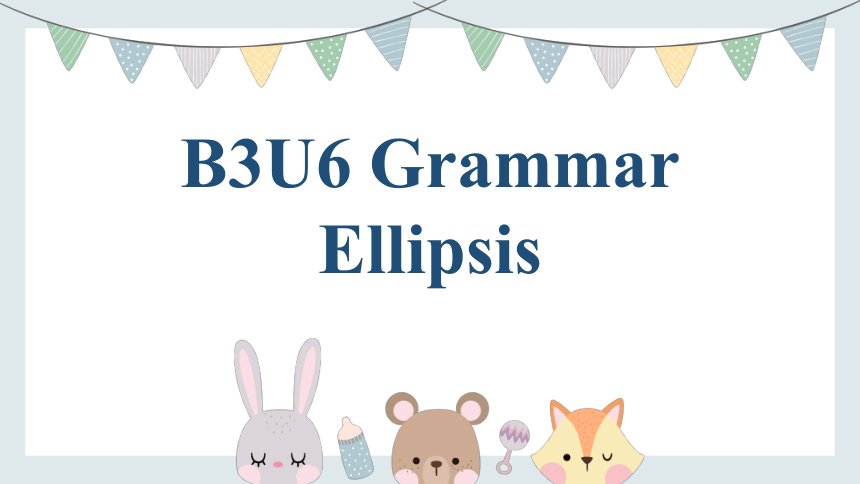 | |
| 格式 | zip | ||
| 文件大小 | 19.5MB | ||
| 资源类型 | 教案 | ||
| 版本资源 | 外研版(2019) | ||
| 科目 | 英语 | ||
| 更新时间 | 2022-09-19 13:25:09 | ||
图片预览

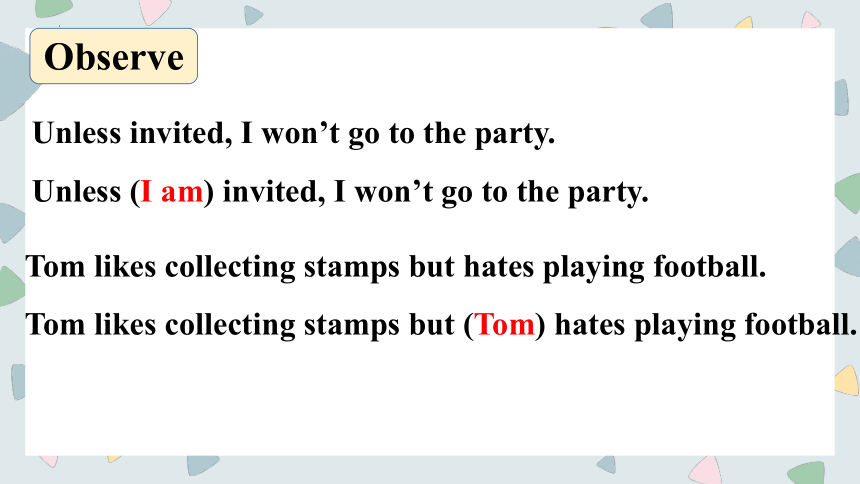
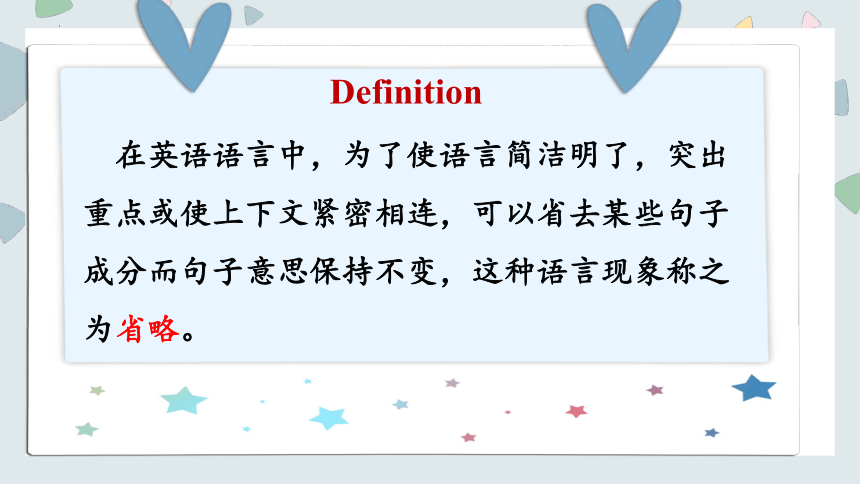


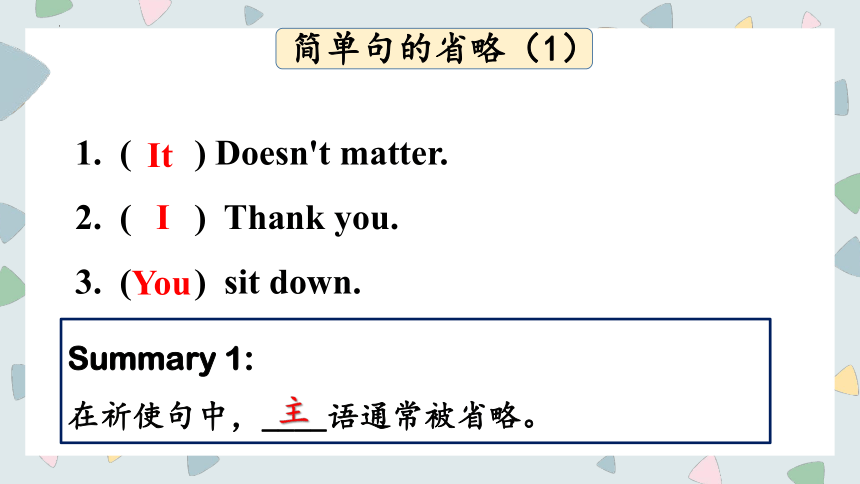
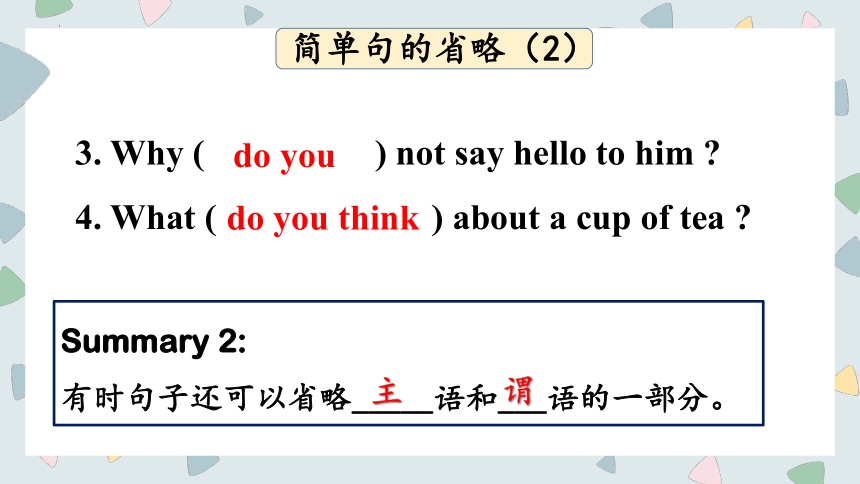
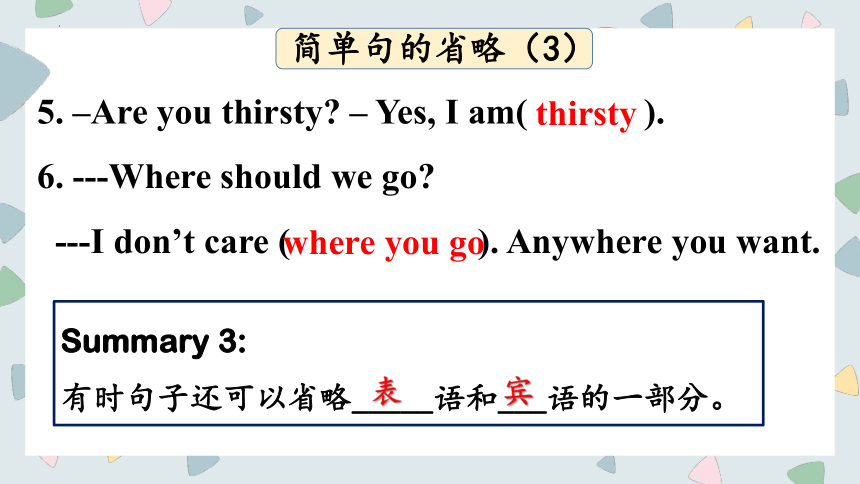
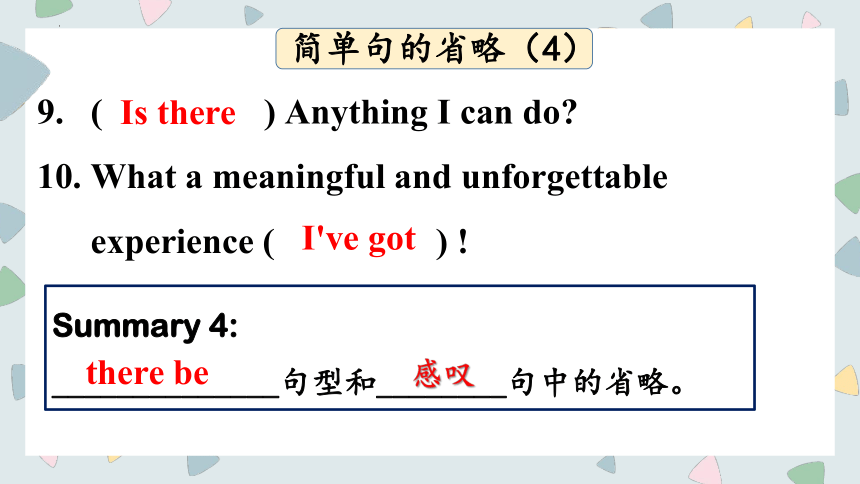
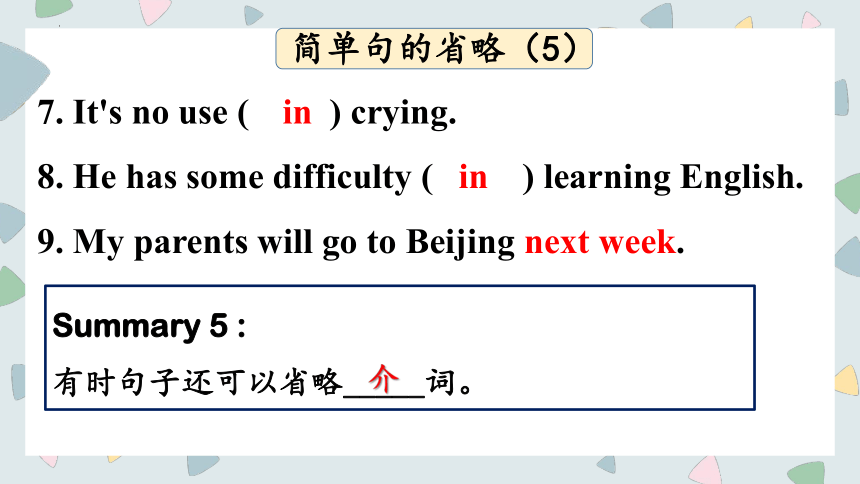

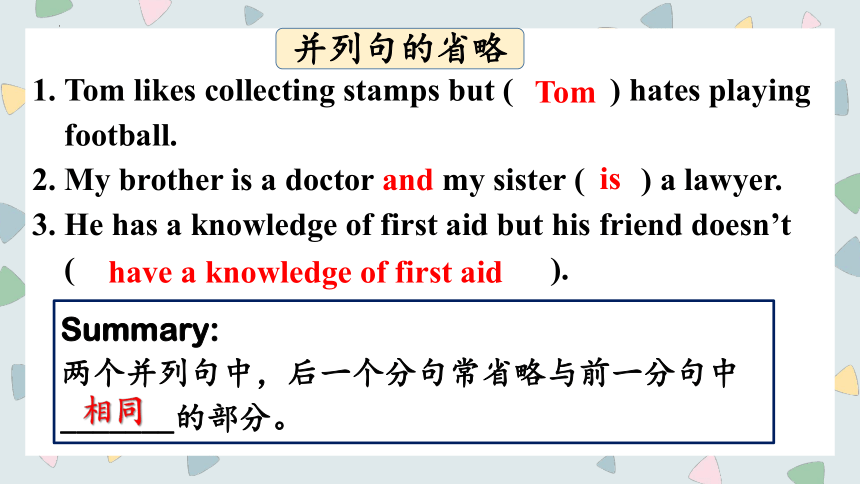
文档简介
(共31张PPT)
B3U6 Grammar
Ellipsis
Unless invited, I won’t go to the party.
Unless (I am) invited, I won’t go to the party.
Observe
Tom likes collecting stamps but hates playing football.
Tom likes collecting stamps but (Tom) hates playing football.
Definition
在英语语言中,为了使语言简洁明了,突出重点或使上下文紧密相连,可以省去某些句子成分而句子意思保持不变,这种语言现象称之为省略。
目录
CONTENTS
简单句中的省略
01
并列句中的省略
02
复合句中的省略
03
其它的省略
04
第一部分
简单句中的省略
Observation one:在祈使句中,____语通常被省略。
简单句的省略(1)
1. ( ) Doesn't matter.
2. ( ) Thank you.
3. ( ) sit down.
Summary 1:
在祈使句中,____语通常被省略。
主
It
I
You
Observation one:在祈使句中,____语通常被省略。
3. Why ( ) not say hello to him
4. What ( ) about a cup of tea
Summary 2:
有时句子还可以省略_____语和___语的一部分。
主
do you
do you think
谓
简单句的省略(2)
Observation one:在祈使句中,____语通常被省略。
5. –Are you thirsty – Yes, I am( ).
6. ---Where should we go
---I don’t care ( ). Anywhere you want.
Summary 3:
有时句子还可以省略_____语和___语的一部分。
表
thirsty
where you go
宾
简单句的省略(3)
Observation one:在祈使句中,____语通常被省略。
9. ( ) Anything I can do
10. What a meaningful and unforgettable
experience ( ) !
Summary 4:
______________句型和________句中的省略。
感叹
Is there
I've got
there be
简单句的省略(4)
Observation one:在祈使句中,____语通常被省略。
7. It's no use ( ) crying.
8. He has some difficulty ( ) learning English.
9. My parents will go to Beijing next week.
Summary 5 :
有时句子还可以省略_____词。
介
in
in
简单句的省略(5)
第二部分
并列句中的省略
Observation one:在祈使句中,____语通常被省略。
并列句的省略
1. Tom likes collecting stamps but ( ) hates playing
football.
2. My brother is a doctor and my sister ( ) a lawyer.
3. He has a knowledge of first aid but his friend doesn’t
( ).
Summary:
两个并列句中,后一个分句常省略与前一分句中_______的部分。
相同
Tom
is
have a knowledge of first aid
第三部分
复合句中的省略
Observation one:在祈使句中,____语通常被省略。
状语从句的省略
1. Though ( ) tired, they went on working.
2. While ( ) walking in the park, I saw my good friend.
Summary:
在以when, while, once引导的时间状语从句及以if,unless引导的条件状语从句中和though, although引导的让步状语从句中,如果主从句的主语一致或从句主语为It,且从句中含有be动词时,从句中可省去___________部分。
主语+be
they were
I was
Attention!
Had he (=_________________) taken my advice,
he would have succeeded.
If he had
Summary:
虚拟条件句中常省略if,将_________________提到主语前。
had, were, should
Observation one:在祈使句中,____语通常被省略。
宾语从句的省略(1)
You were late again, and I hope you will explain why
( ).
Summary 1:
由which, when, where, how和why引导的宾语从句,
若从句中表达的内容与主句内容重复,可将其省略,
仅保留疑问词。
you were late again
Observation one:在祈使句中,____语通常被省略。
We all know ( ) the earth runs around the sun.
Mary said ( ) she is from American and that she is 16 years old.
Summary 2:
宾语从句中常省略连词____,但当有两个并列的宾语从句时,第___个that则不能省略。
that
that
that
二
宾语从句的省略(2)
Observation one:在祈使句中,____语通常被省略。
We suggest that Smith ( ) be told about his physical condition as soon as possible.
Summary 3:
suggest, insist, order, require等表示建议、要求、命令的动词后接的名词性从句中,谓语动词常用
“should+动词原形”,should可以省略。
should
宾语从句的省略(3)
Observation one:在祈使句中,____语通常被省略。
—Is he coming back tonight
—I think so.(= )
—Is he feeling better today
—I'm afraid not.(= )
Summary 4:
为了避免重复前面所说过的内容,用替代词 “so”表赞同前述事实,“not”表不赞同前述事实。
常与believe, do, expect, fear, guess, hope, say, speak, suppose, think, I'm afraid等连用。
I think he is coming back tonight.
宾语从句的省略(4)
I'm afraid he is not feeling better today.
Observation one:在祈使句中,____语通常被省略。
定语从句的省略(1)
1. I haven’t read the book (that/ which)you’re reading.
2. That is the man (whom) I met in the park yesterday.
Summary 1:
关系代词that, which, who, whom在限制性定语从句中作宾语,前无介词时可以省略。
Observation one:在祈使句中,____语通常被省略。
定语从句的省略(2)
What surprised me was not what he said but the way
(that/ in which) he said it.
Summary 2:
在定语从句中,way作先行词,且在句中充当方式状语时,可省略引导定语从句的关系代词。
第四部分
其它的省略
虚拟语气中的省略(1)
Had you come here yesterday, you would have met her.
如果你昨天来这儿的话,你就会见到她了。
Summary 1:
虚拟条件句常省略if,而将were/had/should提前构成部分倒装。
虚拟语气中的省略(2)
We insisted that they (should) go with us.
我们坚决要求他们和我们一起走。
It is suggested that we (should) go to see the film.
有人建议我们去看这部电影。
Summary 2:
在“一坚持”(insist);“二命令”(order,command);“三建议”(suggest, propose, advise);“四要求”(demand, require, request,ask)等后的宾语从句中,含这些词的派生词的其他主语从句、同位语从句、表语从句,以及“It is strange/natural/necessary/important that...” 从句中,常省略should。
动词不定式的省略(1)
What we need to do now is (to) study hard.
Summary 1:
当主语中有实义动词“do”的某种形式时,
作表语的不定式可省略“to”。
动词不定式的省略(2)
He hopes to finish his work and (to) go back home as soon as possible. (并列关系)
I haven't decided whether to go camping or to stay at home. (对比关系)
Summary 2:
两个或多个不定式短语表示并列关系时,后面不定式短语的不定式符号“to”通常被省略;如果表示对比关系,则不定式中的不定式符号“to”通常要保留。
动词不定式的省略(3)
I saw her (to) go into the classroom just now.
She was seen to go into the classroom just now.
Summary 3:
使役动词及感官动词后面作宾语补足语的不定式一定要省去“to”, 但在被动语态中须将“to”复原。
动词不定式的省略(4)
–Are you going there – Yes, I’d like to (go there).
I asked him to stay here, but he refused to (stay).
Though Jack isn't a driver, he used to be (a driver).
–He hasn’t finished the task yet.
–Well, he ought to have (finished the task).
Summary 4:
动词不定式中为了避免重复,省去与前面出现的相同部分,只保留“to”,但如果在省略的不定式结构中含有be, have, have been时,要保留这些词。
介词的省略(1)
I have some trouble (in) learning English.
我学英语有困难。
Summary 1:
在英语中一些与动词、名词、形容词搭配的介词常被省略,而只保留后面的动名词。如:
spend time/money (in) doing sth.
have difficulty/trouble (in) doing sth.
prevent/stop sb. (from) doing sth.
介词的省略(2)
We have a final exam every term.
每学期我们举行一次期末考试。
Summary 2:
表示时间的介词at、on和in,
在next、last、this、each、these、yesterday、every、tomorrow等词之前,一般省略。
Thank you!
B3U6 Grammar
Ellipsis
Unless invited, I won’t go to the party.
Unless (I am) invited, I won’t go to the party.
Observe
Tom likes collecting stamps but hates playing football.
Tom likes collecting stamps but (Tom) hates playing football.
Definition
在英语语言中,为了使语言简洁明了,突出重点或使上下文紧密相连,可以省去某些句子成分而句子意思保持不变,这种语言现象称之为省略。
目录
CONTENTS
简单句中的省略
01
并列句中的省略
02
复合句中的省略
03
其它的省略
04
第一部分
简单句中的省略
Observation one:在祈使句中,____语通常被省略。
简单句的省略(1)
1. ( ) Doesn't matter.
2. ( ) Thank you.
3. ( ) sit down.
Summary 1:
在祈使句中,____语通常被省略。
主
It
I
You
Observation one:在祈使句中,____语通常被省略。
3. Why ( ) not say hello to him
4. What ( ) about a cup of tea
Summary 2:
有时句子还可以省略_____语和___语的一部分。
主
do you
do you think
谓
简单句的省略(2)
Observation one:在祈使句中,____语通常被省略。
5. –Are you thirsty – Yes, I am( ).
6. ---Where should we go
---I don’t care ( ). Anywhere you want.
Summary 3:
有时句子还可以省略_____语和___语的一部分。
表
thirsty
where you go
宾
简单句的省略(3)
Observation one:在祈使句中,____语通常被省略。
9. ( ) Anything I can do
10. What a meaningful and unforgettable
experience ( ) !
Summary 4:
______________句型和________句中的省略。
感叹
Is there
I've got
there be
简单句的省略(4)
Observation one:在祈使句中,____语通常被省略。
7. It's no use ( ) crying.
8. He has some difficulty ( ) learning English.
9. My parents will go to Beijing next week.
Summary 5 :
有时句子还可以省略_____词。
介
in
in
简单句的省略(5)
第二部分
并列句中的省略
Observation one:在祈使句中,____语通常被省略。
并列句的省略
1. Tom likes collecting stamps but ( ) hates playing
football.
2. My brother is a doctor and my sister ( ) a lawyer.
3. He has a knowledge of first aid but his friend doesn’t
( ).
Summary:
两个并列句中,后一个分句常省略与前一分句中_______的部分。
相同
Tom
is
have a knowledge of first aid
第三部分
复合句中的省略
Observation one:在祈使句中,____语通常被省略。
状语从句的省略
1. Though ( ) tired, they went on working.
2. While ( ) walking in the park, I saw my good friend.
Summary:
在以when, while, once引导的时间状语从句及以if,unless引导的条件状语从句中和though, although引导的让步状语从句中,如果主从句的主语一致或从句主语为It,且从句中含有be动词时,从句中可省去___________部分。
主语+be
they were
I was
Attention!
Had he (=_________________) taken my advice,
he would have succeeded.
If he had
Summary:
虚拟条件句中常省略if,将_________________提到主语前。
had, were, should
Observation one:在祈使句中,____语通常被省略。
宾语从句的省略(1)
You were late again, and I hope you will explain why
( ).
Summary 1:
由which, when, where, how和why引导的宾语从句,
若从句中表达的内容与主句内容重复,可将其省略,
仅保留疑问词。
you were late again
Observation one:在祈使句中,____语通常被省略。
We all know ( ) the earth runs around the sun.
Mary said ( ) she is from American and that she is 16 years old.
Summary 2:
宾语从句中常省略连词____,但当有两个并列的宾语从句时,第___个that则不能省略。
that
that
that
二
宾语从句的省略(2)
Observation one:在祈使句中,____语通常被省略。
We suggest that Smith ( ) be told about his physical condition as soon as possible.
Summary 3:
suggest, insist, order, require等表示建议、要求、命令的动词后接的名词性从句中,谓语动词常用
“should+动词原形”,should可以省略。
should
宾语从句的省略(3)
Observation one:在祈使句中,____语通常被省略。
—Is he coming back tonight
—I think so.(= )
—Is he feeling better today
—I'm afraid not.(= )
Summary 4:
为了避免重复前面所说过的内容,用替代词 “so”表赞同前述事实,“not”表不赞同前述事实。
常与believe, do, expect, fear, guess, hope, say, speak, suppose, think, I'm afraid等连用。
I think he is coming back tonight.
宾语从句的省略(4)
I'm afraid he is not feeling better today.
Observation one:在祈使句中,____语通常被省略。
定语从句的省略(1)
1. I haven’t read the book (that/ which)you’re reading.
2. That is the man (whom) I met in the park yesterday.
Summary 1:
关系代词that, which, who, whom在限制性定语从句中作宾语,前无介词时可以省略。
Observation one:在祈使句中,____语通常被省略。
定语从句的省略(2)
What surprised me was not what he said but the way
(that/ in which) he said it.
Summary 2:
在定语从句中,way作先行词,且在句中充当方式状语时,可省略引导定语从句的关系代词。
第四部分
其它的省略
虚拟语气中的省略(1)
Had you come here yesterday, you would have met her.
如果你昨天来这儿的话,你就会见到她了。
Summary 1:
虚拟条件句常省略if,而将were/had/should提前构成部分倒装。
虚拟语气中的省略(2)
We insisted that they (should) go with us.
我们坚决要求他们和我们一起走。
It is suggested that we (should) go to see the film.
有人建议我们去看这部电影。
Summary 2:
在“一坚持”(insist);“二命令”(order,command);“三建议”(suggest, propose, advise);“四要求”(demand, require, request,ask)等后的宾语从句中,含这些词的派生词的其他主语从句、同位语从句、表语从句,以及“It is strange/natural/necessary/important that...” 从句中,常省略should。
动词不定式的省略(1)
What we need to do now is (to) study hard.
Summary 1:
当主语中有实义动词“do”的某种形式时,
作表语的不定式可省略“to”。
动词不定式的省略(2)
He hopes to finish his work and (to) go back home as soon as possible. (并列关系)
I haven't decided whether to go camping or to stay at home. (对比关系)
Summary 2:
两个或多个不定式短语表示并列关系时,后面不定式短语的不定式符号“to”通常被省略;如果表示对比关系,则不定式中的不定式符号“to”通常要保留。
动词不定式的省略(3)
I saw her (to) go into the classroom just now.
She was seen to go into the classroom just now.
Summary 3:
使役动词及感官动词后面作宾语补足语的不定式一定要省去“to”, 但在被动语态中须将“to”复原。
动词不定式的省略(4)
–Are you going there – Yes, I’d like to (go there).
I asked him to stay here, but he refused to (stay).
Though Jack isn't a driver, he used to be (a driver).
–He hasn’t finished the task yet.
–Well, he ought to have (finished the task).
Summary 4:
动词不定式中为了避免重复,省去与前面出现的相同部分,只保留“to”,但如果在省略的不定式结构中含有be, have, have been时,要保留这些词。
介词的省略(1)
I have some trouble (in) learning English.
我学英语有困难。
Summary 1:
在英语中一些与动词、名词、形容词搭配的介词常被省略,而只保留后面的动名词。如:
spend time/money (in) doing sth.
have difficulty/trouble (in) doing sth.
prevent/stop sb. (from) doing sth.
介词的省略(2)
We have a final exam every term.
每学期我们举行一次期末考试。
Summary 2:
表示时间的介词at、on和in,
在next、last、this、each、these、yesterday、every、tomorrow等词之前,一般省略。
Thank you!
